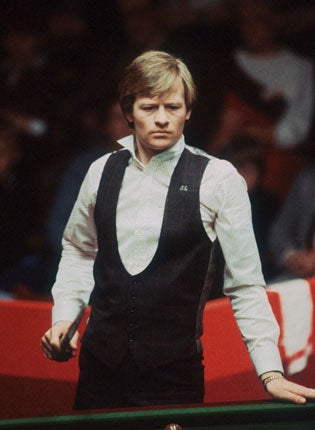James Lawton: Farewell to the Hurricane who swept his sport into modern era
We should remember Higgins for transforming snooker, not tales of drink and anarchy

There is a standard eulogy for the wild men of sport who have touched our lives with the sharp edge of their genius.
We itemise the appalling nature of much of their existence and then we dribble out the lines of redemption. Sometimes, though, there is a stronger resonance in the reactions to their passing and there is no question that in this rare category no one this weekend served the memory of Alex Higgins better than the man who often seemed to be occupying a different planet.
The chaos wrought by the Hurricane, which finally blew out so forlornly in the flat in Belfast where he lived alone, did not, said Steve Davis, disguise the fact that the game of snooker as a popular spectator sport, rather than a smoky, hustling subculture, had in the process never acquired a deeper debt.
Davis, the multi-world champion, the relentless compiler of success and the self-disciplinary values he believed were essential to its continuation, said quite simply that Higgins was the reason why so many people turned to snooker, with an extraordinary quickening of the pulse in the Seventies and the Eighties.
"He made snooker come alive for the people in a way that no one has ever matched," declared Davis, and anyone who was around when Higgins first came storming out of East Belfast with a cue in one hand and a bottle of vodka in the other could only say Amen.
The phrase about the cue and the vodka is hardly original, rather another touch of nostalgia, because it was one that led to a ferocious phone call of complaint from the subject when it was first used more than 30 years ago. Higgins was outraged. He said it trivialised his standing in the sport in which he had become a world champion nearly a decade earlier. He played hard, he practised hard and the idea that he was an unfettered playboy who did nothing more than ride his natural talent to its limits was offensive, and, one might later find out, also perhaps actionable.
He was a Hurricane, all right, and even back then it was natural to worry where the wind would blow him. Predictably enough, it brought dismay and despair but, if the price of excess was savage and long drawn-out, there was, at least, that last recognition of his unique contribution to sport by the men who were required to hold the first rush of his brilliance in some kind of check.
The old hand John Spencer couldn't do it in 1972, when the Ulsterman won the first of his two world titles as a 22-year-old, but the cool, mustachioed Canadian Cliff Thorburn did it eight years later when he edged him 18-16 in the final when the Crucible theatre in Sheffield suddenly became one of the more compelling arenas in front-line sport.
Thorburn made an impressive contribution to the rising tide of snooker. He talked vividly of his days hustling in the pool halls of North America, including the marathon in San Francisco when, towards the end, his opponent opened his cue case and reached for a bottle of pep pills nestling against the butt of a powerful handgun. But then he added quickly that nothing in any form of his sport demanded quite as much nerve as countering the man from Belfast. "The fact is," he said, "Higgins is capable of anything, good or bad, outrageous or something so brilliant it just goes off the chart."
Inevitably, the obituaries have been laced with drink and anarchy, the head-buttings, the threats to opponents, the mayhem in the hotels that were the staging posts of his decline. But thanks to men like Davis and Thorburn, Ronnie O'Sullivan and the man who did everything but stand on the mountain top, Jimmy White, the best of the Hurricane's legacy will plainly not lack protection.
Higgins' crowning moment was maybe his 1982 world title victory over Ray Reardon, but then no one will forget the extraordinary chemistry he brought to the Crucible when he came back to overwhelm Jimmy White in the semi-final. He was behind, 14-15, and apparently beaten but then he reached down and shot out the lights as surely as Doc Holliday ever darkened a Dodge City saloon.
Not so long ago, Higgins was recounting to some drinking companions one of his most notable hustling triumphs, one when he overcame a handicap of 33. "Not such a problem for a man like you," he was told. "My handicap," he said, "was that I could only score off the yellow."
He said it with another shrug, the man who had been so careless with so much of his life. Except, that is, on those occasions when he produced the best of an amazing talent. His peers, at least, have made it clear that such times will neither be forgotten nor, still less, devalued.
Subscribe to Independent Premium to bookmark this article
Want to bookmark your favourite articles and stories to read or reference later? Start your Independent Premium subscription today.

Join our commenting forum
Join thought-provoking conversations, follow other Independent readers and see their replies